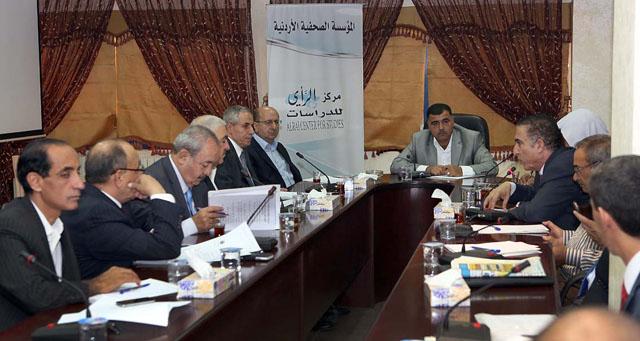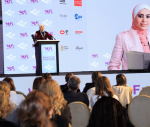You are here
Ball of reform in stakeholders’ court — analysts
By Mohammad Ghazal - Sep 14,2014 - Last updated at Sep 14,2014
AMMAN — His Majesty King Abdullah’s fifth discussion paper dispels all doubts about progress of reform amidst a turbulent region and is a call on all stakeholders to exercise their roles towards desired reform, political analysts, journalists and professional association officials said Sunday.
The discussion paper, which is part of a series His Majesty launched in December 2012, is a contribution to the national debate on reforms in the Kingdom, meant to address all challenges and needed steps towards required reform.
“The ball is now in the court of all stakeholders, including the government, legislators, political parties, civil society and all segments of the community to do their part of the job to achieve the desired reforms. This is a roadmap that needs to be followed by actual implementation on the ground,” Samih Maaytah, Al Rai columnist and former minister of state for media affairs, told The Jordan Times Sunday.
Maaytah said the Royal paper provided a long-term vision for the reform process in the country, while stressing that there is no excuse for delaying reforms.
He added that the paper puts an end to all speculation about the role of the monarchy in the country.
“Recently, there have been calls by the opposition for giving less powers for King, while on the other hand there were calls for increasing the King’s constitutional powers. This paper put an end to this issue by highlighting that the King is the guarantor for the Constitution and the safety valve of the country,” said Maaytah.
In the paper entitled “Goals, Achievements and Conventions: Pillars for Deepening Our Democratic Transition”, King Abdullah said the monarchy should provide unifying leadership for all Jordanians and remain forward looking to ensure prosperity not just for the current generation, but for future generations as well.
“As Head of State and Commander-in-Chief of the Armed Forces, the King is responsible for paramount issues of foreign policy and national security, and for protecting Jordan’s social fabric and religious heritage, acting through the Council of Ministers, which has the constitutional responsibility to administer state affairs. The Monarchy is also the guarantor of the Constitution and the guard of neutrality, stability and justice, which intervenes to break deadlocks between parliaments and governments when they arise,” said the Monarch.
Mohammad Hatamleh, head of the Jordan Nursing and Midwives Association, said the King’s message was “clear and urging all concerned parties to do their jobs”.
“In light of the regional conditions and the spiralling violence, there have been claims that Jordan is not serious about reforms and that authorities are using regional conditions as a pretext not to go ahead with related plans. The King has put an end to this by stressing that evolutionary, home-grown reform will not be affected by regional developments,” Hatamleh said.
“The King’s fifth paper is a direct call for the implementation of progressive projects and programmes. It stresses the leadership’s commitment to reform,” the unionist added.
In the paper, the King said the ìJordanian Springî must also continue to adopt essential democratic practices, including respect for and embracing dialogue, accepting the reciprocity of rights and responsibilities as citizens, accepting that shared sacrifices lead to shared gains, turning disagreement into finding compromise, while maintaining constant dialogue, and active and constructive participation by all citizens.
Meanwhile, the Civil Coalition for Monitoring the Jordanian Parliamentary Elections (Rasid) on Sunday commended King Abdullah’s latest discussion paper and his call for a more active role of civil society institutions and more openness to them. In a column in Al Ghad daily, Ayman Safadi said the so-called Arab Spring and regional development proved the solid stand and resilience of Jordan and its capability to overcome the problems it is facing, an ability that stems from the political heritage of the country.
“The Jordanian Monarchy never resorted to killing or intimidating people… Jordan saw in the sweeping changes in the region an opportunity rather than a threat,” said Safadi.
There is a growing belief that a gradual approach to reform is the most feasible until the country’s institutions are ready for the change, said Safadi, adding that there is a need for national consensus on upcoming goals and how to achieve them to start taking actual steps on the ground.
In its editorial Sunday, Al Rai newspaper noted that the Royal paper focuses on the upcoming steps and roles of all stakeholders.
The document stresses the genuine desire and commitment to continuous reforms in the Kingdom, while specifying the tasks vested in each partner to realise such goals, Al Rai said.
Related Articles
Strengthening Jordan’s internal front through rule of law and equality among citizens is the main pillar for achieving the desired reforms and restoring citizens’ confidence in the state, lawmakers, politicians and professional association officials said Monday.
Jordan celebrates His Majesty King Abdullah’s 52nd birthday on Thursday.
AMMAN — His Majesty King Abdullah drew a line in the sand regarding the aspired civil state, helping remove all doubts and controversies on


















